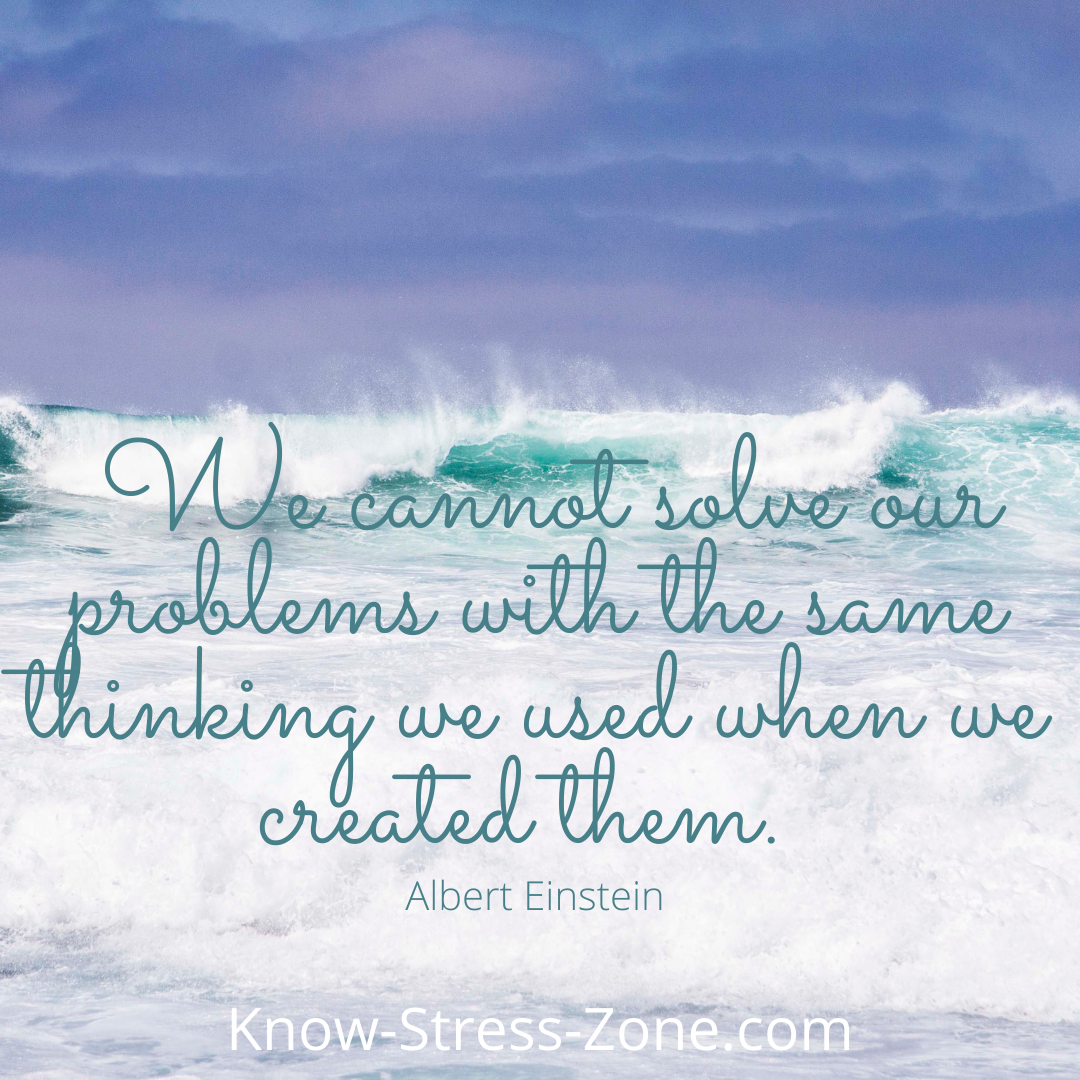Stop Avoiding My Problems: 6 Steps to Take Today
Stop Avoiding My Problems: It was gnawing away at me from the inside for months. My stomach ached, my chest was tight and my breathing shallow. I wasn’t sleeping well and I was both sad and irritable. The anxiety also made me feel as though I was crawling out of my skin.
|
The cause: a chronically ill parent and the fights that ensued with family members over how we should proceed with care. One fight was so bad that we didn’t speak for months. The pain continued to erode my body and soul. I wanted to open up lines of communication but I was engaging in avoidance. I was afraid to approach those whom I had hurt with my words. I was sad and willing yet paralyzed from reaching out. Procrastination, passive-aggressiveness, and rumination are examples of unhelpful short-term coping mechanisms that we may consciously or unconsciously use to avoid tackling a tough issue or facing thoughts and feelings that are uncomfortable. Bingo! That was me. |
Saying “the hell with you” to my family and avoiding them made me feel justified, safe, and well-entrenched in my defenses. But it was a temporary feeling. It became easier for me to lay down in bed after dinner and not do the usual evening walk with my wife. It's all too easy to become exhausted.
As the saying goes: “Wherever you go, there you are.” We never outrun our problems. The joke was on me. You may have debt issues and family challenges. You may be facing the discomfort of embarking on a new job search. The challenges can take on many forms. But fret not!
The following ideas demonstrate how we can successfully tackle our issues and move toward a future where we are no longer afraid of them.
Consider the following:
Face It And Own It
Make Yourself Accountable. Admit that avoidance is no longer acceptable. For example, if you're attempting to better manage your finances, force yourself, NO, encourage yourself to keep track of how much you consume versus your income. Accept the challenge and commit to overcoming it.
Ask others to help keep you accountable. Share your goals with them and the steps you are taking. Ask them to keep an eye out and ask you about your progress. Be sure to update them on a regular basis.
Finally, keep track of your progress!
Go For The Low-Hanging Fruit First
Work through the easiest phases first after splitting the problem into manageable sections. For example, if you’ve been procrastinating looking for a new job, begin the process by first updating your résumé, contacting and asking for references, studying the positions you desire, and speaking with individuals who work in that profession. Keep track of each step and be proud of your progress. Doing so will help keep you motivated when things get more challenging.
Don’t Be Afraid To Use Your Support System
This goes with the first bullet point. We may feel alone and overwhelmed in this world, but if we stop and take a look around, we will realize there are quite a few people in our lives who are willing to be there for us.
There is no shame in asking for help. Doing so is a sign of strength. It takes courage to admit you need support. If your support system is lacking then get to work! Reach out and create one that works for you.
Devise A Plan
How will you tackle your issue? Don’t be afraid to ask your support network for ideas. I can assure you that the problem you are facing has most likely been overcome by others. Taking some time to process and learn about the problem and how others have overcome it is a great way to start.
Focus On The Benefits
- Peace of mind
- Improved sleep
- Healthier body, less prone to illness because of reduced stress
- Improved relationships
- Increased courage and self-esteem from having faced and overcome your problems. This will help you be better equipped to face future challenges.
- An Enriched Life: you have taken another step in your evolution on planet Earth. You are also closer to fulfilling your potential as a human being.
We have learned that running away is not a viable long-term solution. Getting back to my tense relationship with my family, we all decided to take that step and no longer give in to avoidance. We had the “spirited” discussion and ended on a positive note, united and ready to help one another.
I know you too can do this. ~Ted
How to Stop Avoiding My Problems: 6 Steps to Take Today ~parts adapted via Psychcentral.com
|
1. Separate the problem into smaller steps After dividing the problem into feasible parts, work through the easiest steps first, Example: You’re avoiding looking for a new job. You break down this big task into getting your resume updated, identifying and contacting references, researching the jobs you want, talking to people you know who work in the industry, etc. 2. Access your inner wisdom Our inner wisdom (or “wise self” or “true self”) is the little voice that says, “don’t say that, you’re going to ‘regret it later’ when you’re feeling like lashing out at someone.” Or it says, “‘slow down, you’re going to get a ticket’ when you’re anxious because you’re late for work.’” |
Our inner wisdom considers the consequences and what’ll be most helpful in the long term. It doesn’t discount emotions or put them in charge. Instead, it takes into account your emotions, logical thinking and intuition.
So when you’re avoiding something, check in with yourself to see if you’re relying purely on emotions or logical thinking.
3. Practice mindfulness
Mindfulness is about being in the present moment, with your full attention, and with acceptance. How does this end avoidance?
When you’re focused on what’s happening right now, you notice the urge to avoid a situation and your accompanying emotions (such as anxiety). Instead of judging the experience, you accept it, which is the opposite of avoidance.
If you’re avoiding something, you’re not accepting it, you’re rejecting the possibility of having the experience for whatever reason.
Of course, not judging our experience is really hard. It’s what the human brain does, but we can practice acceptance.
Acceptance involves two parts: recognizing when you’re judging something; and working toward using more accepting language. That is, identify the facts surrounding the situation and your feelings about it.
Example: Instead of saying, “This stinks” when you don’t get a promotion at work, you say, “I’m disappointed and frustrated, but there’s nothing I can do about it. What can I do so I have a chance next time?”
In other words, acceptance isn’t about dismissing your thoughts or feelings. It’s about expressing them — out loud or to yourself — in a nonjudgmental way.
4. Be accountable to yourself or others
For instance, you’re trying to face your bank account and budget better, so you record the money you’re spending and what you’re spending it on. Or you tell a friend that you’ll update them every day on an overwhelming project at work. Or you support each other in getting taxes organized.
5. Decide that it's okay to be uncomfortable for what you want
For instance, if you’re socially anxious, make a decision to go to a party and speak to two new people even if that feels scary. If you’re dreading your credit card bill, open the envelope, because you’ve decided to straighten out your finances. If you’re anxious about having a hard conversation with your spouse, bring it up gently because you know it’s an important topic.
6. Seek support
Seek support if you don’t have the skills or knowledge you need. That support might include seeing a therapist, hypnotherapy, reading a book, taking a class or talking to a friend who has experience dealing with similar situations.
As a whole, avoidance isn’t healthy, but in some cases it can be. It depends on whether you’re letting your emotions rule or you’re accessing your inner wisdom.
Example: You have a friend who leads a very chaotic life. Any time you’re with her, you get caught up in her drama and your mood sinks. Lately, when you think about spending time with her, you get anxious. You decide that the healthiest choice is not to see her (i.e., to avoid her). Instead of letting your anxiety rule, you make a wise choice that honors your well-being (i.e., access your inner wisdom).
However, if you’re thinking, “Oh god, I can’t stand the thought of seeing her today. I can’t do it. I’m going to text her telling her I’m sick,” then you’re reacting from your emotion and letting it control you.
When navigating avoidance, the key is to check in with yourself and make a choice that genuinely serves you and contributes to your well-being, both right now and in the long run.
How to Stop Avoiding My Problems and More Brain Hacks Stop Avoiding My Problems Stop Avoiding My Problems Stop Avoiding My Problems Stop Avoiding My Problems Stop Avoiding My Problems Stop Avoiding My Problems Stop Avoiding My Problems Stop Avoiding My Problems

